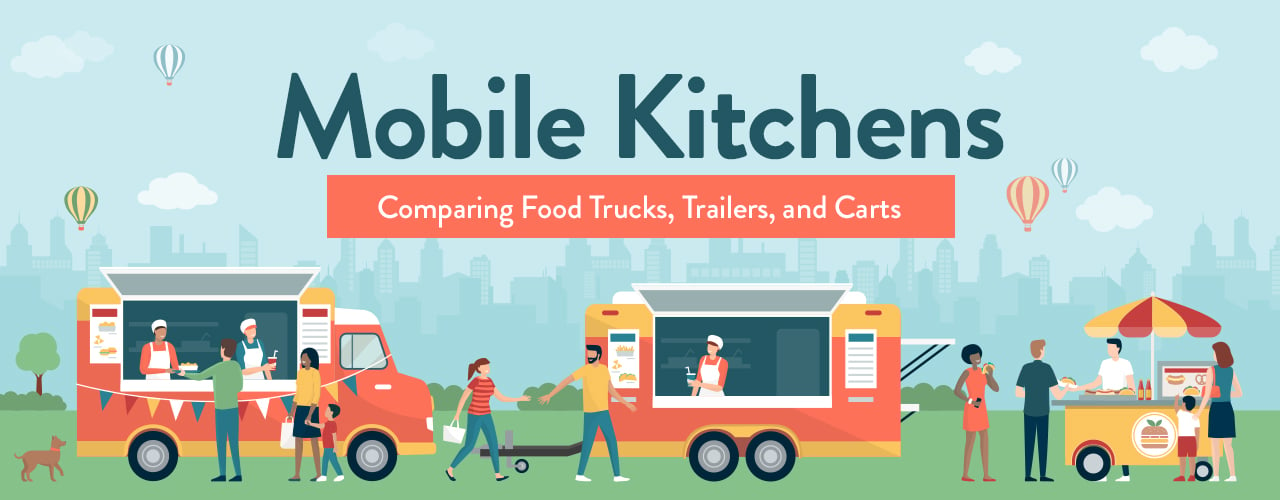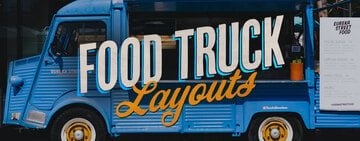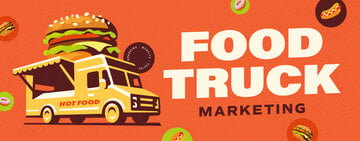Which Mobile Food Business Is Right for You?
Last updated on Jan 14, 2026Janine JonesThe food truck industry is the fastest growing sector of the larger foodservice industry, so it’s no secret that food trucks are taking the nation by storm. Their popularity has grown so rapidly that several cities are known for their food truck scene. With the food truck market estimated to reach $1.1 billion in 2022, you may be interested in joining this thriving industry.
Before you do, you may want to ask yourself if a food truck is right for you or if there is a better mobile food business model that would better suit your business. We set out to compare food trucks, food trailers, and food carts to help you determine which vehicle would be best for your mobile kitchen endeavors.
Food Truck vs Food Trailer vs Food Cart
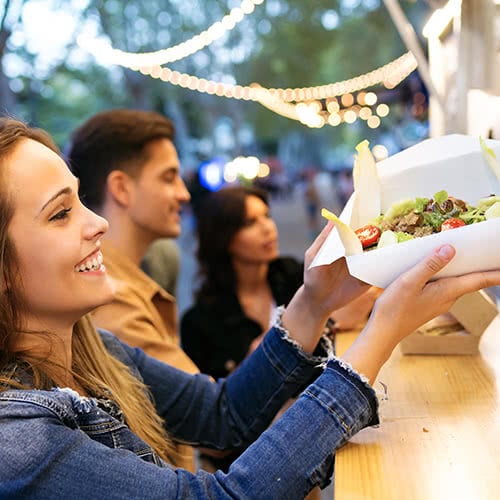
Mobile food businesses come in various styles and sizes to serve a variety of purposes. It is important to consider their differentiating characteristics before choosing your primary food transport vehicle.
These are the main characteristics to review when deciding between a food truck vs food trailer or a food cart vs food truck:
1. Mobile Kitchen Size
The size of your mobile kitchen will determine where you can park and what types of events you can attend.
- Food Trailer - the largest in size, ranging from 8-53 feet long and 7-8 1/2 feet wide
- Food Truck - usually ranges from 10-26 feet long and 7 feet wide
- Food Cart - smallest in size, ranging 4-7 feet long and 2-6 feet wide
2. Kitchen Space and Storage Capacity
The size of your interior kitchen space can have an impact on what you can bring with you and your staff size.
- Food Trailer - large enough for full-sized restaurant equipment, cleaning supplies, and full cooking staff
- Food Truck - reduced size may call for more dependence on countertop cooking equipment, space-saving storage solutions, and a staff of 1-3 cooks
- Food Cart - limited space may call for very few small appliances and warmers and a staff of 1-2 employees
3. Mobile Kitchen Price
Start to shape your budget by knowing what a mobile kitchen may cost you before you invest.
- Food Trailer - ~$30,000-$50,000
- Food Truck - ~$50,000 - $250,000
- Food Cart - ~$5,000 - $20,000
4. Vehicle Mobility
The way a mobile kitchen navigates can help determine which events and locations they best cater to.
- Food Trailer - Needs to be towed from place to place, may be too large for certain parking locations
- Food Truck - vehicle and kitchen in one, can be driven from place to place
- Food Cart - Needs to be pushed by hand, attached to a bicycle, or towed from main kitchen to serving location
5. Mobile Kitchen Location and Event Type
The type of locations and events a mobile kitchen is designed for can help you choose the right one for your business model.
- Food Trailer - large events, seasonal fairs, wedding and concert venues
- Food Truck - city street, fairs and carnivals, block parties, parks
- Food Cart - city sidewalks, amusement parks, boardwalks
6. Mobile Kitchen Menu Capabilities
The size and selections of your menu can be directly impacted by the size of your mobile kitchen
- Food Trailer - can have a full menu, multi-course menu
- Food Truck - narrowed to a few items that follow a similar theme or cuisine type
- Food Cart - limited to one or two specialty items and some snacks
7. Purpose
Choose a mobile kitchen that best helps you reach your target demographic.
- Food Trailer - long-term parking, multi-day events
- Food Truck - stop-and-go location hopping
- Food Cart - foot traffic and walking distance coverage of a location
The vehicle type you choose can ultimately impact your entire food truck business plan, so it is important to consider these factors early in the process. Ultimately, the best vehicle for your brand will come down to your goals and budget.
Food Truck
Food trucks are one of the most popular mobile food vehicles in the United States. If you’re considering starting a food truck, check out some of the pros and cons before your buy.
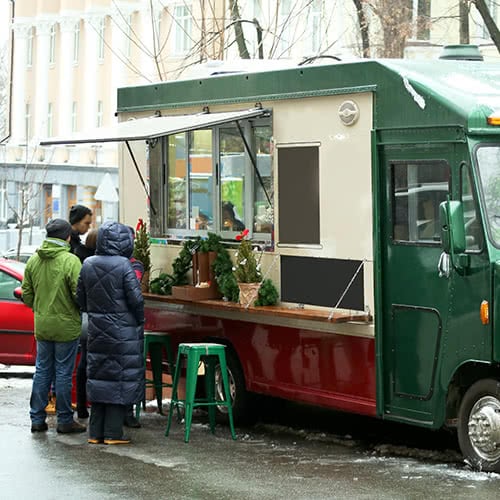
What Is a Food Truck?
A food truck is the combination of a motor vehicle and a kitchen. Food trucks are typically 16 feet long and 7 feet wide but can range in size from 10-26 feet long. This versatile vehicle is designed for street parking to serve pedestrians that may be passing by. Food is prepared and cooked in the vehicle and sold to individual customers from the window on the side of the truck.
Pros
Here are some benefits of choosing a food truck for your business over a food trailer or food cart:
- Kitchen does not need to be towed, making it extremely mobile and easy to take from one location to the next more lucrative location
- Single unit means you don’t need a separate transport vehicle
- Vehicle size easily fits down most city streets and in most parking spaces, providing a simple driving experience
- Compact size means fewer appliances to clean than a standard kitchen
- Mobility makes it perfect for stop-and-go services and provides access to spots all across town
- Versatility of the space allows for a flexible menu and menu experimentation
- Since food trucks are extremely popular, they have excellent resale value
Cons
Depending on your business model, there may be some downsides to choosing a food truck instead of a food trailer or food cart:
To find out more information on purchasing a food truck, check out our how to buy a food truck buying guide.
Food Trailer
If you’re looking for more space, a food trailer may be the right option for you. Keep reading to learn about the specifications, pros, and cons of food trailers to determine which mobile food vehicle is the best for your business.
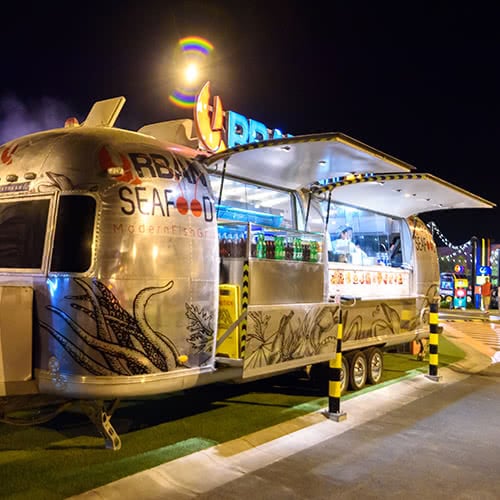
What Is a Food Trailer?
A food trailer is a mobile kitchen that you hitch onto a vehicle to tow from one location to the next. Kitchen trailers can vary greatly in size, ranging anywhere from 8-53 feet long and 7-8 1/2 feet wide. These ever-customizable vehicles are designed to cater to large crowds during multi-hour or even multi-day events like weddings and state fairs.
Pros
The following are some benefits of choosing a food trailer over a food truck or food cart:
- Kitchen can be towed by any vehicle, so business does not need to stop for vehicle maintenance
- Since the kitchen trailer and transport vehicle are not connected, the trailer can be dropped off at an event and the vehicle can be used to run errands during the event
- Generally less expensive than food trucks, and up to 1 1/2 feet wider for more space
- Large size allows food business to cater large venues
- Large internal blueprint provides ample space for full-sized equipment, ingredient storage, disposables, and cleaning supplies
- Full kitchen means you can offer a multi-course menu, have a full staff, and serve several customers at once
- Varying sizes allows you to find a food trailer in your budget and customized to your needs and specifications
- Can be used as a secondary kitchen to expand on the space of an existing building or used as a primary kitchen during renovations/disaster relief
- Mileage is not logged on the trailer, so you can continuously take it from location to location without worrying about depreciation in value caused by an increase in mileage
Cons
There are some downsides associated with concession trailers that are important to consider before making your purchase:
If you’re looking to cater wedding venues with your mobile food business or establish a booth at your local state fair, a concession trailer may be the right choice to expand your business beyond a brick-and-mortar location.
Food Cart
If you’re just starting your food business or looking to target more foot traffic with your seasoned specialties, a food cart may be a great way to reach the most customers in your area. Learn more about the pros and cons of selecting a food cart for your business model by reading on.
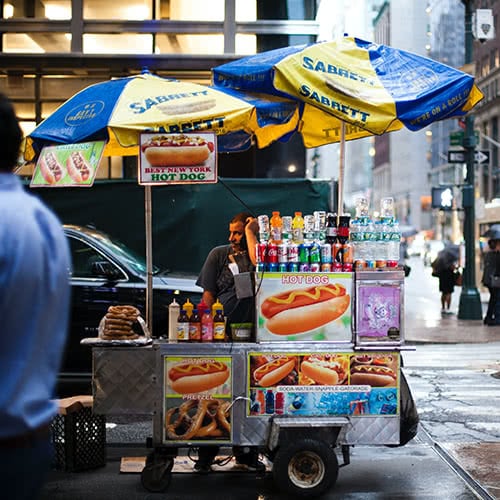
What Is a Food Cart?
A food cart is a compact mobile kitchen that can either be pushed by hand or towed with a car or bicycle. Food carts range in size from 4-7 feet long and 2-6 feet wide. The food server will generally serve from behind the cart since they are typically not enclosed structures. Most food carts only have one piece of cooking equipment and a warmer to hold food at temperature. Food carts are designed to attract foot traffic from nearby walking paths to serve an individual customer at a time.
Pros
Explore the following benefits of a food cart to help you make your mobile food vehicle decision:
- Highly affordable option for new business owners to get into the mobile food scene
- Compact size is perfect for busy sidewalks to target specific walking paths during lunch rushes in major cities
- Mobility allows you to bring food options to locations where large brick-and-mortar cannot go, such as parks, fairs, boardwalks
- Does not need to be hitched to be transported, meaning that you can quickly readjust your location to target a more lucrative spot
- Can help create a close relationship with locals because carts provide eye-level customer service
- Space-saving size allows for simple and safe storage overnight and during off-seasons
- Comes with a reputation of a niche menu, allowing your cart to be known for its signature selections in the neighborhood
Cons
The compact size of a food cart can also come with some drawbacks for your business.
A food cart can be a great vehicle to help you start a farmers market stand or serve refreshing summer treats on your local boardwalk.
Mobile food vehicles have continued to dominate foodservice trends from year to year, and we’re expecting to see their popularity continue to rise as customers reduce their dine-in options due to the coronavirus. Whether you're deciding between a food truck vs food cart, you can use the pros and cons above to find the perfect mobile food business for your menu.
